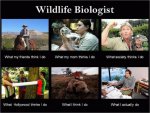lkwoolsey
WKR
- Joined
- Jul 18, 2016
- Messages
- 1,001
Ok, so this is pretty random but I figured this wouldn't be a bad place to post.
I got out of the Army about a year and a half ago with the idea of going to school for a biology degree and knocking out premed reqs and then going on to med school. But this past 6 to 8 months, I've been looking more and more at wildlife biology, particularly in Alaska or Idaho (Alaska if I can convince my wife!)
Basically, I'm just wondering if any of you know/ are a wildlife biologist and can tell me what an actual day is like. The description on a lot of the different state websites sounds great (hiking around, collecting data on different animal populations, presenting it to help in establishing tag limits, dealing with nuisance animals, etc.) but I want to know if that is the day to day, or the once a year experience.
Again, kind of random but I figure this would be a good place to gain some perspective. Thanks!
I got out of the Army about a year and a half ago with the idea of going to school for a biology degree and knocking out premed reqs and then going on to med school. But this past 6 to 8 months, I've been looking more and more at wildlife biology, particularly in Alaska or Idaho (Alaska if I can convince my wife!)
Basically, I'm just wondering if any of you know/ are a wildlife biologist and can tell me what an actual day is like. The description on a lot of the different state websites sounds great (hiking around, collecting data on different animal populations, presenting it to help in establishing tag limits, dealing with nuisance animals, etc.) but I want to know if that is the day to day, or the once a year experience.
Again, kind of random but I figure this would be a good place to gain some perspective. Thanks!

